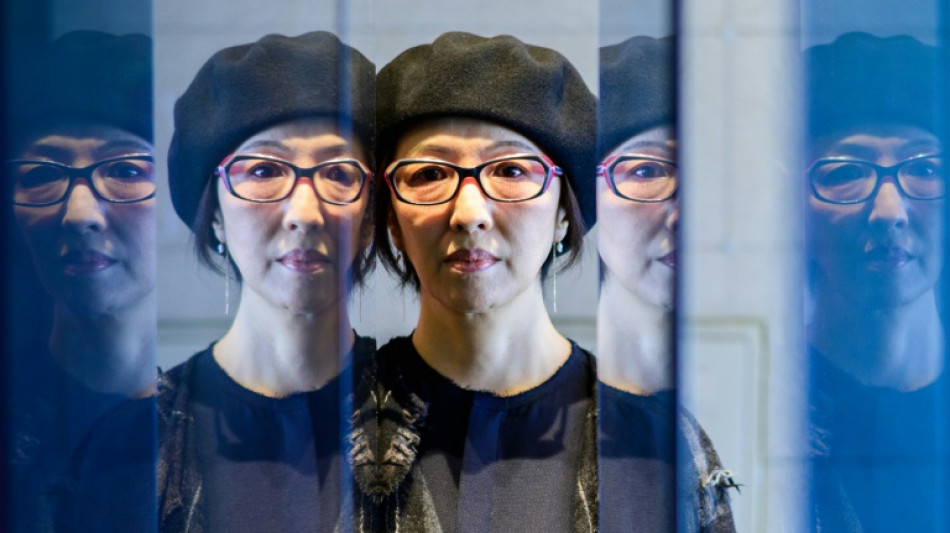
-
 Denmark's Andresen swoops to win Cadel Evans Road Race
Denmark's Andresen swoops to win Cadel Evans Road Race
-
Volkanovski beats Lopes in rematch to defend UFC featherweight title

-
 Sea of colour as Malaysia's Hindus mark Thaipusam with piercings and prayer
Sea of colour as Malaysia's Hindus mark Thaipusam with piercings and prayer
-
Exiled Tibetans choose leaders for lost homeland

-
 Afghan returnees in Bamiyan struggle despite new homes
Afghan returnees in Bamiyan struggle despite new homes
-
Mired in economic trouble, Bangladesh pins hopes on election boost

-
 Chinese cash in jewellery at automated gold recyclers as prices soar
Chinese cash in jewellery at automated gold recyclers as prices soar
-
Israel to partially reopen Gaza's Rafah crossing

-
 'Quiet assassin' Rybakina targets world number one after Melbourne win
'Quiet assassin' Rybakina targets world number one after Melbourne win
-
Deportation raids drive Minneapolis immigrant family into hiding

-
 Nvidia boss insists 'huge' investment in OpenAI on track
Nvidia boss insists 'huge' investment in OpenAI on track
-
'Immortal' Indian comics keep up with changing times

-
 With Trump mum, last US-Russia nuclear pact set to end
With Trump mum, last US-Russia nuclear pact set to end
-
In Sudan's old port of Suakin, dreams of a tourism revival

-
 Narco violence dominates as Costa Rica votes for president
Narco violence dominates as Costa Rica votes for president
-
Snowstorm barrels into southern US as blast of icy weather widens

-
 LA Olympic chief 'deeply regrets' flirty Maxwell emails in Epstein files
LA Olympic chief 'deeply regrets' flirty Maxwell emails in Epstein files
-
Rose powers to commanding six-shot lead at Torrey Pines

-
 Barca wasteful but beat Elche to extend Liga lead
Barca wasteful but beat Elche to extend Liga lead
-
Konate cut short compassionate leave to ease Liverpool injury crisis

-
 Dodgers manager Roberts says Ohtani won't pitch in Classic
Dodgers manager Roberts says Ohtani won't pitch in Classic
-
Arsenal stretch Premier League lead as Chelsea, Liverpool stage comebacks

-
 Korda defies cold and wind to lead LPGA opener
Korda defies cold and wind to lead LPGA opener
-
New head of US mission in Venezuela arrives as ties warm

-
 Barca triumph at Elche to extend Liga lead
Barca triumph at Elche to extend Liga lead
-
Ekitike, Wirtz give Liverpool sight of bright future in Newcastle win

-
 West Indies 'tick boxes' in shortened T20 against South Africa
West Indies 'tick boxes' in shortened T20 against South Africa
-
Chelsea have something 'special' says Rosenior

-
 De Zerbi 'ready to go to war' to solve Marseille troubles
De Zerbi 'ready to go to war' to solve Marseille troubles
-
Hornets hold off Wemby's Spurs for sixth NBA win in a row

-
 Moyes blasts killjoy booking after Everton's late leveller
Moyes blasts killjoy booking after Everton's late leveller
-
Ex-prince Andrew again caught up in Epstein scandal
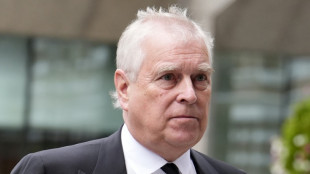
-
 Bayern held at Hamburg to open door for Dortmund
Bayern held at Hamburg to open door for Dortmund
-
Atletico stumble to draw at Levante, Villarreal held
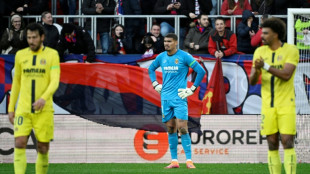
-
 Chelsea stage impressive fightback to beat West Ham
Chelsea stage impressive fightback to beat West Ham
-
Arsenal stretch Premier League lead, Chelsea fightback breaks Hammers' hearts

-
 Napoli edge Fiorentina as injury crisis deepens
Napoli edge Fiorentina as injury crisis deepens
-
How Lego got swept up in US-Mexico trade frictions
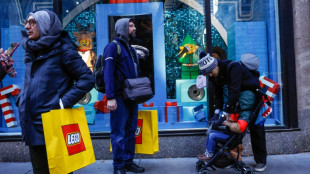
-
 UK rights campaigner Tatchell arrested at pro-Palestinian protest
UK rights campaigner Tatchell arrested at pro-Palestinian protest
-
Iran says progress made towards US talks despite attack jitters
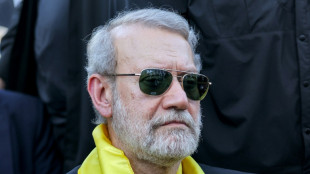
-
 'Empowering': Ireland's first female sumo wrestler blazes a trail
'Empowering': Ireland's first female sumo wrestler blazes a trail
-
US judge denies Minnesota bid to suspend immigration sweeps
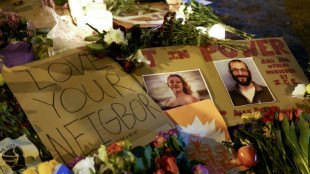
-
 AC Milan prolong France 'keeper Maignan deal by five years
AC Milan prolong France 'keeper Maignan deal by five years
-
Arteta hails Arsenal's statement rout of Leeds

-
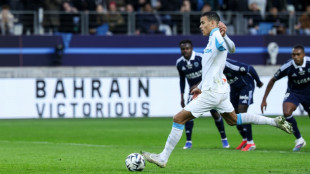 Marseille buckle as Paris FC battle back for draw
Marseille buckle as Paris FC battle back for draw
-
Protesters demand 'justice' one month after Swiss bar fire
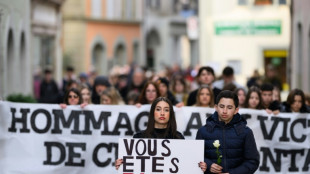
-
 Philadelphia's Paul George gets 25-game NBA drugs ban
Philadelphia's Paul George gets 25-game NBA drugs ban
-
La Rochelle suffer defeat after shock Atonio retirement
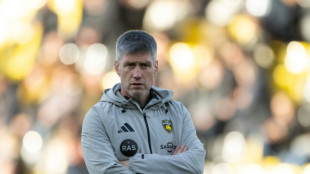
-
 'It wasn't working': Canada province ends drug decriminalization
'It wasn't working': Canada province ends drug decriminalization
-
Kishan, Arshdeep star as India down New Zealand in T20 finale


Korean director takes on decades of generational trauma
Award-winning filmmaker Yang Yonghi was just six years old when she watched her eldest brother leave Japan for North Korea as one of 200 "human gifts" for leader Kim Il Sung's 60th birthday.
As a North Korean anthem blared, through bursts of confetti, he handed her a note before his ferry departed Niigata port: "Yonghi, listen to a lot of music. Watch as many movies as you want."
It was 1972, a year after her parents -- members of the ethnic Korean "Zainichi" community in Japan -- had sent their other two sons the same way, lured by the Kim regime's promise of a socialist paradise with free education, healthcare and jobs for all.
The boys never moved back.
"My parents dedicated their entire lives to an entity that came up with such a senseless project and forced them to sacrifice their own children for it," Yang, now 57, told AFP.
The trauma of being ripped apart from her siblings reverberates in all of Osaka-born Yang's films, which document the suffering of her family across generations -- from the end of Japanese colonial rule to decades after the split of the Korean peninsula.
Her father was a prominent pro-North Korean activist in Osaka, and had sent his sons to live there in the 1970s as part of a repatriation programme organised by Pyongyang and Tokyo.
Around 93,000 Japan-based Koreans left for North Korea under the scheme between 1959 and 1984. Yang's eldest brother was among 200 university students specially chosen to honour Kim Il Sung.
The regime's promises came to almost nothing, but the Zainichi arrivals were forced to stay. Their families could do little to bring them back.
Yang's parents "had no choice after having already sent their children. To keep the kids safe (in North Korea), they couldn't leave the regime, and had to become even more devoted," she said.
"I was so angry at the system that kept my brothers as hostages."
Unlike her parents, Yang rebelled.
- 'I wanted to be free' -
Yang said she faced discrimination in Japan -- repeatedly denied jobs and fired from a film project because of her Korean heritage.
She also had to grapple with the pro-North Korean sentiment in her community.
Her father was a prominent figure in the Chongryon organisation -- Pyongyang's de facto embassy in Japan -- which ran the university where she studied literature.
During her time at the school, when students were asked to interpret texts with leader "Kim Jong Il's literary theories", Yang said she once submitted a blank page.
And at home, where portraits of North Korean leaders Kim Il Sung and Kim Jong Il hung side by side, she resented her parents for sending her brothers away.
"I wanted to be free," Yang told AFP.
"I could have... pretended I was Japanese, and avoided being honest about my father and brothers, acting as if I don't recognise any problems."
"But to really break free, I had to confront them all."
After a failed marriage and spending some three years as a teacher at a Pyongyang-linked high school, she left for New York to study documentary filmmaking.
And it was through movies that she began to unpack the story of her family.
Her first documentary, "Dear Pyongyang", was released in 2005 to critical acclaim, including at the Sundance and Berlin film festivals.
It offered a rare, independent look inside North Korea, featuring footage from Yang's camcorder during her trips to visit her brothers.
It infuriated the Chongryon, which demanded an apology.
By then, Yang had acquired South Korean nationality, making it impossible for her to ever visit her brothers again.
"It's a huge price, but I have no regrets. I at least stayed true to my own desire -- to make a movie, and to tell a story about my own family," Yang explained.
- Desperate for a homeland -
Yang's latest step in that quest is the film "Soup and Ideology", set for a theatrical release this year.
It focuses on her mother Kang Jung-hee, who fiercely loves her children but is also deeply loyal to Pyongyang.
For 45 years, she sent food, money and other goods to her sons in Pyongyang, including Seiko watches to be exchanged for cash.
Yang said her mother was often "unnaturally and overly cheerful", telling people that her sons are doing well in Pyongyang "thanks to the North Korean leaders".
"But at home, she would cry alone," the director said, especially after Kang's eldest son was diagnosed with bipolar disorder.
Yang said her mother would send any medicine for the disease she could afford from Japan to North Korea, without knowing what he might need.
He died in 2009.
In her old age, she told Yang of yet another traumatic event -- a bloody crackdown by South Korean forces on Jeju Island in 1947-54 to crush an uprising.
As many as 30,000 people were killed, according to the National Archives of Korea.
They included Kang's fiancee and relatives.
"My mother is someone who desperately wanted a homeland. She wanted to belong to Jeju but she was forced to leave. She didn't see her place in Japan," Yang said.
"She was looking for a government that she could trust, and she believed in North Korea."
That is where Yang's two surviving brothers remain.
Despite the struggles facing her, Yang said she still wanted to speak out.
"Since I was young, I was constantly told: 'don't say this, don't say that, always say this'," she told AFP.
"I realised I wanted to do it whatever the price."
P.Santos--AMWN